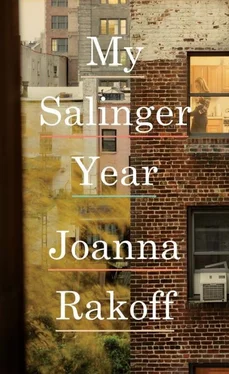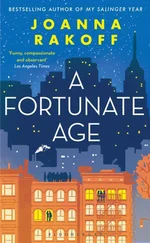Don waved to me from a table at the front window, usually our favorite, a rarely won prize. But tonight the waiting throng kept jostling him and knocking his bag down. Every few minutes someone opened the door, letting in a gust of freezing air. I ordered coffee, though what I really wanted was food, food and wine. Not a bagel. Real food. Dinner. Don jostled his leg up and down, gnawed on a hangnail; his fingers were bitten to bloody stubs. He had his journal out, open in front of him, the pages moist from the tips of his fingers.
“So, I have news,” I told him as the waitress set my coffee down. The coffee at the L was terrible, actually, though this apparently didn’t dissuade people from lining up for it. But the coffee at the L was beside the point, I supposed, glancing around me. Everyone was so attractive. Had they been this attractive a year ago? Don, I realized, was older than most everyone in the room. No, the point of the L was not the coffee. The point of the L was to be at the L. “I have news,” I said again, though this was not a phrase I habitually used. I just wanted his attention. “So, I sold a story.”
Don glanced—unhappily, irritably—toward the counter, where a troupe of young girls—or, well, girls my age—congregated, ordering coffees in anticipation of a table, but he seemed to be staring past them. “This is bullshit,” he said. “Let’s get out of here. I can’t think straight.”
Out on Bedford, in the frigid air, he smiled. “Much better,” he said. “What was going on in there?”
Across the street, at Planet Thailand, it was also crowded, but we found a tiny table across from the stove. A few feet away, the chef shook a wide silver wok, enormous flames shooting up its sides. “I sold a story,” I told Don, again, after we’d ordered papaya salad and rice noodles.
“What?” he said, looking at me with unvarnished hostility. “One of your stories? I didn’t even know you’d ever actually finished a story. Not since college.”
“A client’s story,” I said. “One of my boss’s clients.”
“Oh,” said Don, letting out an enormous breath. His face broke into a smile. “That’s completely different. As long as you’re not a threat to me. We can’t have that.” He let out one of his cackles.
“Of course not,” I said, prying apart my chopsticks with a snap.
“I thought all your boss’s clients were dead,” he said, wiping his glasses with the edge of his T-shirt.
“This one is almost dead, I think,” I said, with a pang of disloyalty to my boss, to her client.
“Like the Agency.” Something in Don’s voice had changed. At the L, I was invisible to him. This happened all too frequently. But he could see me now. I had reappeared for him. It scared me—and it bothered me—the way I could disappear right in front of his eyes. “That’s really great, Buba. Maybe you’re going to be a big agent. Like Max.” He took a long swallow of ice water. “Maybe you can represent me. Since James doesn’t seem to be doing a very good job.”
I lifted my water glass and took a sip. There was no way I could speak. The thoughts coursing through my brain were too horrible, too disloyal to acknowledge: that I wouldn’t represent him, for I knew—I knew —that his book wouldn’t sell. This was why I’d approached James rather than Max about Don’s novel. I knew Max wouldn’t take it on. I was Max’s reader. If the manuscript had come to me cold—if it hadn’t been my boyfriend’s novel—I would have recommended a form rejection.
I didn’t say this, though. Of course not. I smiled and lifted a few strands of papaya into my mouth. Just then something strange happened, something that seemed, in a way, to have been lifted out of a Salinger story: The chef spilled a spray of chili powder into the flame at his waist, sending a thick fug of smoke directly to our table. Our eyes watered and turned red, and my throat constricted—a terrible, helpless feeling—and, most remarkably, I saw Don for a moment as if from across an abyss, his face distorted by the reddish smoke. How far away he was. How far.
When we got home, there was a small envelope waiting for me, hand addressed. I turned it over: the logo of the small magazine to which I’d sent my poems. “What’s that?” asked Don.
“Nothing,” I said, and slipped it in my bag.
When he seated himself at his desk—the more rejections came in, the more he stared at the screen of his computer—I got into bed and opened it up. The note was from the poetry editor, accepting one of my poems.
That night, I couldn’t sleep. Don, as always, fell like a stone, on his side, earplugs in, mask pulled over his eyes. But my mind wouldn’t stop churning. Maybe I would be an agent, a big agent. Maybe I would seek out new clients for my boss, and eventually she’d let me take one on myself. Maybe. I thought back to that night, just a month or so before, when I’d talked to Jenny—we’d not spoken since—and the thought of being at the Agency in a year had struck me as incomprehensible, nonsensical. And yet—and yet —how could I leave now? I was, as my boss said, on my way.
Quietly, so as not to wake Don, I heated some milk on the stove, then sat down at my desk—a few feet from the bed—turned on my computer and, with some confusion, our little modem, and—with a chorus of blips and bleeps and staticky feedback—went online. In my in-box, I found a note from my college boyfriend. My heart thrummed merely at the sight of his name. “I’ve not heard from you in a while,” he wrote. “I just wanted to check and see if you’re okay. I’m worried that you’re afraid to be in touch with me. Jo, I’m really not mad. I just miss you.” He was mad. I knew he was mad. He deserved to be mad. It’s okay , I wanted to write to him. Be angry at me. Yell and scream. This would all be so much easier if you would just be angry. I don’t deserve your forgiveness . But I couldn’t; I didn’t. Instead, I told him that I’d sold a story. It’s the most thrilling feeling. I can’t quite explain it. I don’t understand it. Rationally, I know that it’s just a business transaction. But I can’t help feeling that there’s more to it: that I brought this story into the world. People will read it because I placed it. Until I placed it, the story belonged only to the writer. Now it will belong to the world. (Also, a magazine just accepted one of my poems. I’m almost afraid to mention it, afraid that if I tell anyone, I’ll jinx everything.)
In the morning, I woke to find I’d left the modem on. Our phone had been busy all night. I began to shut it off, to close my various windows, then noticed there was a new message. “You’re participating in the production of art,” my college boyfriend told me. “Whether you’re making it yourself or shepherding it into the world. You’re doing the right thing. Just stay in the world. If I could come to New York, I would.”
Come , I thought, as I brushed my teeth, please come . I thought of how he had saved me in London, from a crumbling student house off Cartwright Gardens and a terrible, aching loneliness, a loneliness that it seemed only he had the power to cure. He had found for us a beautiful flat in Belsize Park, with wedding-cake moldings and double-height ceilings, a world away from the sink-less, freezing apartment I shared with Don. After he left—to visit his parents before moving to Berkeley for school—I’d cried and cried, but it was only in those months, alone, that I’d truly been able to write. The poems had come, one after another, as I jogged through Hampstead Heath, the stories, too. Why, why? I had missed him so terribly, sobbing on the phone, counting the days until I came back to the States; I had opted not to go on to doctoral work, in part, because I missed him, because London without him seemed like a movie set, the beautiful row houses and gardens, mere props for a life that didn’t exist. Because I loved him, truly loved him, had loved him from the moment I met him, at eighteen.
Читать дальше












